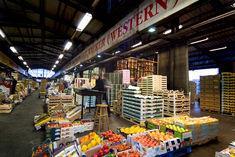
UK wholesale markets are “crying out” for more British produce as a push on home-grown products begins.
Pressure is mounting to sell more UK fresh produce through wholesale markets as British Food Fortnight kicks off.
London’s wholesale markets - and Western International in particular - are said to be keen for more English top fruit, pumpkins and squash, horseradish and British-grown ethnic crops.
Those firms involved in the Business Development Managers (BDMs) scheme at New Covent Garden, Western International and New Spitalfields markets have increased annual turnover by an average of over £100,000 a year as part of the programme.
But price and packaging remain key barriers to increasing volumes of British fruit and vegetables sold through the markets.
Luke Hibberd, commercial director at Abbey View Produce, told FPJ: “We have a good relationship with all the markets in the UK and most traders will stock British instead of foreign produce until it comes down to price. The problem is there is an oversupply of Dutch produce so prices are low. Costs are going up for growers so the price has to go up long term or British growers will stop growing.”
NFU food chain adviser Lorna Hegenbarth said: “The Dutch are very good at packaging and marketing their produce, buyers buy with their eyes and, although the contract caterers value provenance, packaging is an issue. These markets are crying out for produce from growers and producers in this country so this really does open up a lot of new business opportunities.”
The reality fails to match government goals to boost UK production and sales in order to address food security issues.
But Richard Cattell, head of marketing at Red Tractor, said there is a real momentum behind the ‘buy British’ trend at wholesale level as well as retail. Red Tractor is working to produce a set of guidelines and a “sensible” audit for wholesalers to drive the number of assured traders in UK markets. He said: “A number of contract caterers specify the need for assured produce and the news that Red Tractor food is a requirement of the food standards for the London Olympic Games is very good.”
The DEFRA Fruit and Veg Task Force has recommended that the BDM scheme be expanded to other markets. The London project is to be reviewed when it ends on 31 March.
The programme is part of the Mayor of London’s Food Strategy entitled Healthy and Sustainable Food for London which aims to increase the supply of local, regional and sustainable food into the city by working with market traders and the rest of the food chain.
The DEFRA Fruit and Vegetable Task Force has recommended that it be expanded to other markets up and down the country.
NFU chief horticulture adviser Hayley Campbell-Gibbons, horticulture adviser Chris Hartfield, NFU corporate affairs director Tom Hind and food chain adviser Lorna Hegenbarth visited New Spitalfields Market to learn more about the programme this month.



